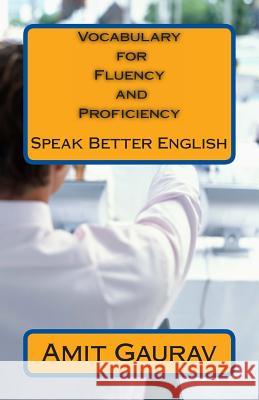Vocabulary for Fluency and Proficiency: Speak Better English » książka
Vocabulary for Fluency and Proficiency: Speak Better English
ISBN-13: 9781491293751 / Angielski / Miękka / 2013 / 116 str.
When you read newspapers or listen to the news bulletins, you do not face any problems in understanding the stories. Your problems start when you try to narrate a story to others or when you attempt to write a good report. Right words don't come to your mind, although you know them. When you think hard to get them, your fluency or speed is adversely affected. You find your language lacking in suitable words and expressions. In other words, you can recognize words and understand them but your power to retrieve them is very limited. If you are experiencing these issues, you should look forward to this book, which follows the logic governing natural learning process. A child learns to speak and gains fluency in a language even before he learns to read or write. He does not learn the language by frequently looking up dictionaries or by reading grammar books, yet he learns the language at an amazing speed. In this, his entire environment is his language learning lab. On the contrary and ironically, most people base their fluency development efforts on grammar books and dictionaries as core materials. Do good speakers really think of grammar rules when they speak? Do they keep recalling synonyms or antonyms as they speak? The answer is a definite 'NO'. Fluency requires prompt retrieval of right words & expressions at the right time as you speak, instead of retrieval of rules of grammar or dictionary definitions of words. Further, fluency demands a lot of creativity on your part. Imitating example sentences given in books limits your ability to express. No book can ever cover your entire range of unique situations. Therefore, your fluency development exercise should not revolve around dictionaries and grammar books as primary materials. If you did that, it would only serve to obstruct your fluency. Hence, gain fluency the natural way: Focus on words, word-groups, sentence-fragments and relate them directly to real-life activities, situations, persons or feelings. Learn to join together words and word-groups. Do this regularly with an open mind. Unleash your power of creativity. This book has been carefully prepared on these lines; and the methodology adopted is designed to provide final solution to most of your language-related worries. Use this book, essentially an exercise book, in your spare time. Develop it as one of your regular hobbies. If practiced regularly in the advised manner, it will help you improve not only your speaking but also your reading and writing skills. For this purpose, the book contains a fairly extensive list of high-frequency standard word-groups over 12000 frequently occurring word-groups/sentence-fragments] for practice. As you start doing the exercises regularly, you will notice a steady progress and by the time you master even half of it, your English language will have seen a quantum leap forward. Though this book is recommended to all lovers of English language, it will be an indispensable asset to students preparing for competitive examinations and to working professionals, who need to excel in group discussions, interviews and meetings.
Zawartość książki może nie spełniać oczekiwań – reklamacje nie obejmują treści, która mogła nie być redakcyjnie ani merytorycznie opracowana.











